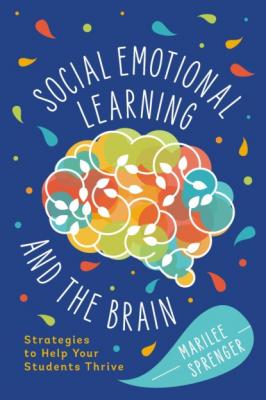ТОП просматриваемых книг сайта:
Social-Emotional Learning and the Brain. Marilee Sprenger B.
Читать онлайн.Название Social-Emotional Learning and the Brain
Год выпуска 0
isbn 9781416629528
Автор произведения Marilee Sprenger B.
Жанр Учебная литература
Издательство Ingram
Social-Emotional Learning and the Brain
Strategies to Help Your Students Thrive
Marilee Sprenger
Table of Contents
ASCD Member Book / Also by the Author
1. Building Teacher-Student Relationships
7. Responsible Decision Making
8. People, Not Programs: The Positive Impact of SEL
Publisher's note: This e-book has been formatted for viewing on e-reading devices.
Select "Publisher Defaults," if your device offers that option, for best viewing experience.
If you find some figures hard to read on your device, try viewing through an application for your desktop or laptop computer, such as Adobe Digital Editions (www.adobe.com/products/digitaleditions).
© ASCD 2020
ASCD Member Book / Also by the Author
. . . . . . . . . . . . . . . . . . . .
Many ASCD members received this book as a member benefit upon its initial release.
Learn more at www.ascd.org/memberbooks
Also by the Author
101 Strategies to Make Academic Vocabulary Stick
Brain-Based Teaching in the Digital Age
Everyday Vocabulary Strategies (Quick Reference Guide)
How to Teach So Students Remember, 2nd Edition
Vocab Rehab: How do I teach vocabulary effectively with limited time? (ASCD Arias)
Dedication
. . . . . . . . . . . . . . . . . . . .
I dedicate this book to all the students who needed an adult in their life to help them cope, overcome, and succeed. We didn't know better. We are trying to do better.
Acknowledgments
. . . . . . . . . . . . . . . . . . . .
There are many to thank for helping this book come to fruition. Stefani Roth, Genny Ostertag, and Allison Scott saw the need for a book connecting brain research to social-emotional learning. Without their support, this would not have come at such an important time for all students and educators. I wish to also thank Miriam Calderone, who always makes me sound so much better. She is an extraordinary editor, and I so appreciate her help.
The experts in the field are many, so I will try to mention those whose work affected me most. Dr. Nadine-Burke Harris, Dr. Bessel van der Kolk, Dr. Dan Siegel, Dr. David Sousa, Dr. Eric Jensen, Dr. Pat Wolfe, Dr. Judy Willis, Dr. Mary Helen Immordino-Yang, Dr. Bob Sapolsky, Dr. Bruce Perry, and Dr. Lori Desautels all added to my knowledge about the brain and the effects of emotions, stress, and trauma on the brain and body.
To Doug Fisher, Nancy Frey, Maurice Elias, Michele Borba, Marc Brackett, Matt Liebowitz, Lisa Barrett, Michael McKnight, Thomas Armstrong, Meena Srinivasan, and Mr. Fred Rogers: thank you all for your contributions to this field to help our students succeed in school and in life.
Always, I am grateful for the love and support of my husband, Scott.
Introduction
. . . . . . . . . . . . . . . . . . . .
Two things should become foundational in our education system: social-emotional learning (SEL) and trauma-informed practices. As educators, we know that many of our students have been

